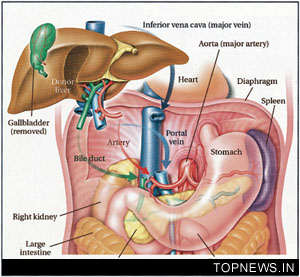Liver transplant patients at increased cancer risk
 Washington, Nov 4: People who have undergone liver transplants are at a greater risk of developing non-Hodgkin's lymphoma and colorectal cancer, say researchers.
Washington, Nov 4: People who have undergone liver transplants are at a greater risk of developing non-Hodgkin's lymphoma and colorectal cancer, say researchers.
A new Canadian study led by Ying Jiang of the Public Health Agency of Canada has shown that liver transplant recipients have higher cancer risk than the general population.
Moreover liver transplant patients were at an approximate twenty-fold increased risk of developing non-Hodgkin''s lymphoma.
The researchers analysed the data of 2,034 patients who received a transplant between June 1983 and October 1998, and followed them for up to 15 years.
They excluded patients who had liver cancer or who had been diagnosed with any other type of cancer (except for non-melanoma skin cancer) before transplantation.
The study showed that group of transplant recipients developed 113 cancers (not including liver cancer), compared to the 44.8 cases that were expected based on rates in the general population.
Moreover liver transplant patients were at an approximate twenty-fold increased risk of developing non-Hodgkin''s lymphoma.
"A striking finding in our study is the approximate twenty-fold increased risk of non-Hodgkin''s lymphoma among liver transplant patients relative to the general population," the authors said.
"As a proportion of all cancers, it represented 55.8 percent of the absolute excess number of cancers among liver transplant patients," they added.
The researchers also found an increased risk of colorectal cancer among liver transplant recipients relative to the Canadian general population, perhaps attributable to a higher prevalence of inflammatory bowel disease among the patients.
"Our findings firmly support an increased incidence of cancer in this patient population," said authors.
"We recommend increased surveillance for cancer in these patients, and screening for colorectal cancer using modalities for which benefits are already well recognized," they added.
Joseph F. Buell of the University of Cincinnati School of Medicine agrees that as long-term survival increases for transplant recipients, cancer is becoming the predominant threat to patient longevity.
"This study highlights several important observations. The increased incidence of cancer appears to be directly related to the intensity and length of immunosuppression, and the link between viral infection and malignancy is strong," he said.
"Currently, two immunosuppressive agents have shown protective effects against the development of cancer," Buell points out. Mycophenolic acid and TOR inhibitors may provide an oncologic advantage for liver transplant recipients," he added.
The findings are published in the November issue of Liver Transplantation, a journal by John Wiley & Sons. (ANI)